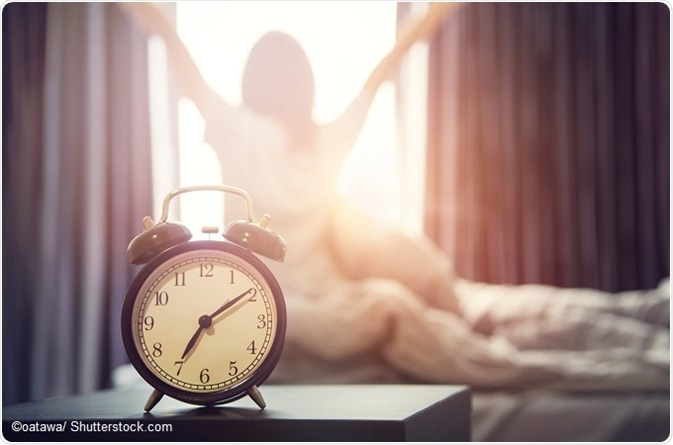Sleep is a potent restorative for not only the body, but also the mind. It improves cognitive function, maintains metabolic homeostasis, and prevents many chronic health conditions.
However, many people find it difficult to get to sleep. Sleep specialists offer some helpful advice on dealing with this condition, such as:
- Develop good sleep hygiene
- Practice stimulus control
- Develop a routine for sleep restriction

Image Credit: oatawa / Shutterstock.com
Sleep hygiene
Establish a bedtime routine to help you relax. This could be as simple as listening to some quiet or ‘sleep’ music or having a warm shower or bath for a few minutes just before going to bed. The bedroom should ideally be closed, comfortable, and darkened. Keep noisy play and other distracting events outside. If you need to share your bed or bedroom with others, try a pair of soft earplugs.
Avoid obvious obstacles such as lumpy or uncomfortable mattresses and hot, stuffy bedrooms. Moderate exercise in the early evening helps with getting better sleep. Stretching or yoga exercises may also help with relaxation at bedtime.
It is not recommended to take on big challenges or emotionally draining tasks immediately before bedtime. Eat an early dinner, and have a healthy light snack at bedtime if needed. Avoid caffeine such as colas, soft drinks, tea, and coffee, in the night to reduce arousal levels and improve sleep quality. Limit the amount of fluid ingested after dinner to avoid having to get up at in the middle of the night to empty your bladder.
Sleep restriction
Sleep restriction may help. This refers to reducing your time in bed to just above your actual sleep time. This will help prevent you from lying awake in bed. Set a regular time for going to sleep, which is around the time you feel tired. This will help your brain understand it is time to get ready to sleep.
Once your actual sleep time corresponds to above 80% of the time in bed, you may increase the latter by 20 minutes. This process is continued until you are able to sleep at least 7-8 hours with a regular bedtime.
Never wait for more than 20 minutes to fall asleep once you are in bed. After that, move to another room, put on a light which is not too bright, and do something quiet and non-stimulating. Avoid using the phone, computer, and/or any other types of screens which may arouse your brain to greater awakeness. Listening to exciting music is also not recommended. The minute you feel sleepy, return to your bed.
No matter how late you get to sleep in this way, make sure you awake on time in the morning to re-adjust the rhythms of your body to the new routine. Avoid long naps of over 30 minutes, or time them for early afternoon.
Sleep | How To Fall Asleep | How To Sleep Fast
Stimulus control
Make sure you do not do anything related to daytime activities in bed if you suffer from insomnia. This includes reading, listening to loud or stimulating music or audio stories, and watching television. The bed should be reserved for sleeping and physical intimacy with your spouse.
General advice
Exposure to early morning sunshine is a technique that is useful to reset the Circadian clock and advance your sleep onset time to coincide with your bedtime. Learn relaxation and stress relief techniques to cope with hyperstimulative responses to others’ stress.
Avoid quick fixes such as sleeping pills, alcohol, and cigarettes. Alcohol acts as a diuretic, forcing you to wake up to go to the bathroom, and may also cause a hangover, besides upsetting your natural sleep rhythms. Tobacco smoking also increases blood pressure and heart rate, causing physiological arousal. Sleeping pills are notorious for causing rebound insomnia.
References
- https://www.cdc.gov/sleep/about_sleep/sleep_hygiene.html
- https://www.betterhealth.vic.gov.au/health/conditionsandtreatments/sleep-hygiene
- https://www.ncbi.nlm.nih.gov/pubmedhealth/PMH0072504/
- https://www.nhlbi.nih.gov/files/docs/public/sleep/healthy_sleep.pdf
- http://www.health.harvard.edu/blog/little-sleep-much-affect-memory-201405027136
Further Reading
Last Updated: Mar 23, 2021